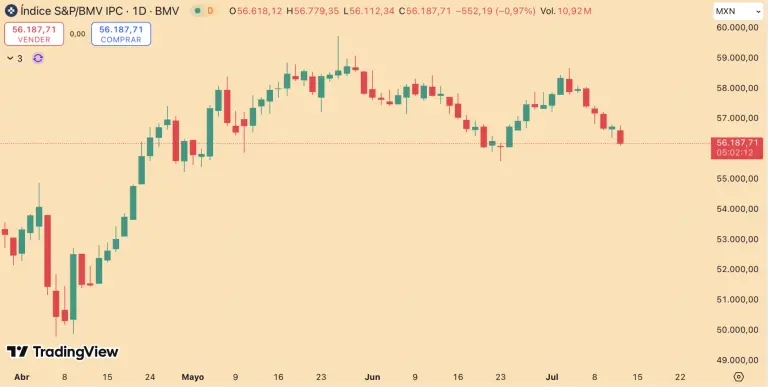Overview of the Current Market Situation
Mexico’s stock markets reverse their recent gains, falling on the last trading day of the week. After a three-day upward trend, local indices are now declining due to worries about US tariffs.
The S&P/BMV IPC, managed by the Bolsa Mexicana de Valores, which includes the most actively traded local stocks, dropped by 1.07% to 56,130.40 points. The FTSE BIVA, operated by the Bolsa Institucional de Valores (Biva), also retreated by 1.01% to a level of 1,131.51 units.

S&P/BMV IPC
Key Stock Declines
Within the benchmark index, most values are falling. Notable declines include:
- Banregio: Down by 3% to 140.35 pesos.
- Asur: A 2.24% decrease to 570.50 pesos.
- Grupo Financiero Banorte: A 1.85% drop to 162.75 pesos.
Investor Concerns Over US Tariffs on Canada
Investors are assessing the announcement by US President Donald Trump regarding tariffs on Canada, causing apprehension about the negotiation of the T-MEC. This agreement, deemed by Trump as “the worst in history” for the US, has sparked concerns among investors.
Who is Donald Trump and Why is He Relevant?
Donald John Trump, born on June 14, 1946, is an American businessman, television personality, and politician who served as the 45th president of the United States from January 20, 2017, to January 20, 2021. His presidency was marked by controversial policies and decisions, including trade agreements like the T-MEC (United States–Mexico–Canada Agreement).
As a protectionist, Trump has frequently used tariffs as a tool to influence trade and protect American industries. His administration’s approach towards Mexico and Canada, two of the US’s largest trading partners, has had significant implications for both countries’ economies.
Impact on Mexico and Canada
The T-MEC, a successor to the North American Free Trade Agreement (NAFTA), aims to modernize and update trade between the three countries. Trump’s criticism of the agreement stems from his belief that it has led to job losses in the US and an unfair trade balance.
The recent concerns about tariffs on Canada have directly affected Mexican stocks, as investors worry about the potential repercussions on regional trade and economic stability. The ongoing negotiations and Trump’s protectionist policies continue to shape the economic landscape for both Mexico and Canada.
Key Questions and Answers
- Q: Who is Donald Trump and why is he relevant in this situation?
A: Donald Trump is the former US president known for his protectionist policies and frequent use of tariffs. His criticism of the T-MEC, a trade agreement between the US, Mexico, and Canada, has caused concern among investors regarding its negotiation and potential impact on regional trade.
- Q: What is the T-MEC and why is it significant?
A: The T-MEC (United States–Mexico–Canada Agreement) is a successor to the North American Free Trade Agreement (NAFTA). It aims to modernize and update trade between the three countries. Trump’s criticism stems from his belief that NAFTA led to job losses in the US and an unfair trade balance.
- Q: How do Trump’s tariffs concerns affect Mexican stocks?
A: Investors’ worries about tariffs on Canada have directly impacted Mexican stocks, causing a decline in local indices as they assess potential repercussions on regional trade and economic stability.






